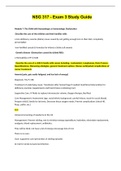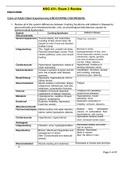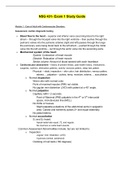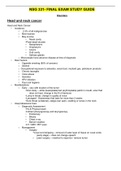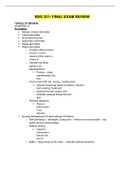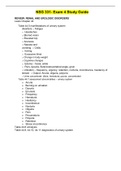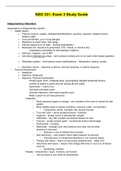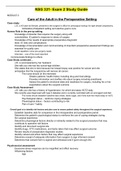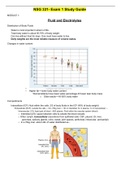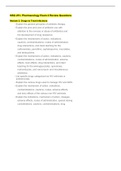Marian University
Latest uploads at Marian University. Looking for notes at Marian University? We have lots of notes, study guides and study notes available for your school.
-
182
- 0
-
18
All courses for Marian University
Latest notes & summaries Marian University
NSG 317 - Exam 3 Study Guide/NSG 317 - Exam 3 Study Guide. Module 7: The Child with Hematologic or Immunologic Dysfunction • Describe the care of the children and their families with: o Iron deficiency anemia (dietary issue caused by not getting enough iron in their diet; completely preventable) Iron-fortified cereals & formulas for infants o Sickle cell anemia Genetic disease Obstruction caused by sickled RBCs o Hemophilia o ITP & SCID
NSG 431- Exam 2 Review/NSG 431- Exam 2 Review. Care of Adult Client Experiencing ENDOCRINE DISORDERS: 1. Review all of the system differences between Cushing Syndrome and Addison’s Disease by glucocorticoids and mineralocorticoids, only, as physiological disturbances caused by Adrenocortical Dysfunction.
NSG 431- Exam 1 Study Guide/NSG 431- Exam 1 Study Guide. Module 1 - Care of Adult with Cardiovascular Disorders Assessment, cardiac diagnostic testing o Blood flow to the heart – superior and inferior vena cava bring blood to the right atrium – through the tricuspid valve into the right ventricle – then pushes through the pulmonic valves into the pulmonic arteries (right and left) passes through the lungs- the pulmonary veins being blood back to the left atrium – pushed through th...
NSG 331- FINAL EXAM STUDY GUIDE/NSG 331- FINAL EXAM STUDY GUIDE. Disorders Head and neck cancer Head and Neck Cancer • Incidence: o 2-3% of all malignancies o Men>women o May involve • Nasal cavity •Para-nasal sinuses • Nasopharynx • Oropharynx • Larynx • Oral cavity • Salivary glands o Most people have advance disease at time of diagnosis • Risk Factors: o Cigarette smoking (85% of cancers) o Alcohol o Occupational exposur...
NSG 331- FINAL EXAM REVIEW/NSG 331- FINAL EXAM REVIEW. TOPICS TO REVIEW: CHAPTER 13 Dermatitis • Allergic contact dermatitis • Irritant dermatitis • Nummular eczema • Seborrheic dermatitis • Stasis dermatitis • Atopic dermatitis o Usually called eczema o Common, chronic, relapsing Often begins in childhood o Familial hay fever
NSG 331- Exam 4 Study Guide/NSG 331- Exam 4 Study Guide. REVIEW: RENAL AND UROLOGIC DISORDERS Lewis Chapter 44 Table 44.5 manifestations of urinary system disorders o Fatigue o Headaches o Blurred vision o Elevated b/p o Anorexia o Nausea and vomiting o Chills o Itching o Excessive thirst o Change in body weight o Cognitive changes
NSG 331- Exam 3 Study Guide/NSG 331- Exam 3 Study Guide. Integumentary Disorders Assessment of Integumentary System • Health History o Previous trauma, surgery, diseases/manifestations, jaundice, cyanosis, delayed wound healing, pallor o Food sensitivities, pet or drug allergies o Reactions to insect bites / bee stings o Chronic exposure to UV light – tanning bed/radiation o Medication Hx: reactions to prescribed, OTC, herbal, or vitamins Any medications prescribed for ...
NSG 331- Exam 2 Study Guide/NSG 331- Exam 2 Study Guide. MODULE 3: Care of the Adult in the Perioperative Setting Case study J.D., a 45-year-old female, presents to the surgeon’s office for presurgical workup for right breast lumpectomy. Ambulatory/Outpatient setting and elective goal is cure. Nurses Role in the pre-op setting Knowledge of disorder that requires the surgery along with comorbidities. ID patient’s response to stress of surgery Knowledge of the results o...
NSG 331- Exam 1 Study Guide/NSG 331- Exam 1 Study Guide. Distribution of Body Fluids Water is most important nutrient of life. Total body water is about 55-75% of body weight. Can live without food for days. One must have water to live. Daily weights are the most reliable measure of volume status
NSG 251- Pharmacology Exam 2 Review Questions/NSG 251- Pharmacology Exam 2 Review Questions. Module 2: Drugs to Treat Infections • Explain the general principles of antibiotic therapy. • Explain the pros and cons of antibiotic use with attention to the overuse or abuse of antibiotics and the development of drug resistance. • Explain the mechanisms of action, indications, cautions, contraindications, routes of administration, drug interactions, and client teaching for the sulfonamid...

